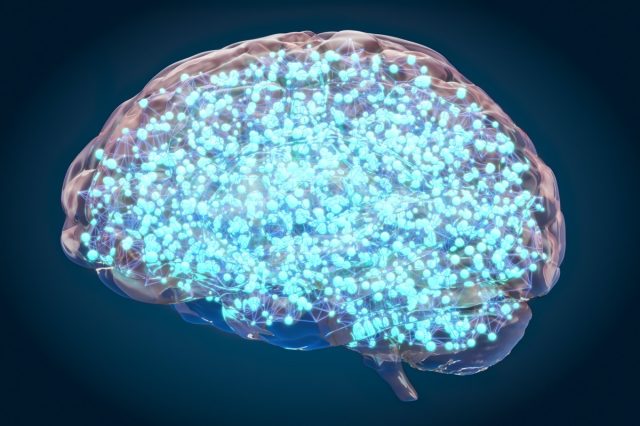According to the National Library of Medicine National Institutes of Health “About 40% of people aged 65 or older have age associated memory impairment—in the United States, about 16 million people. Only about 1% of them will progress to dementia each year.” While having mild memory loss as we get older is part of aging, constant forgetfulness is not an aspect of normal aging and could be an indication of a bigger problem. Eat This, Not That! Health talked to medical experts who explained memory loss problems to worry about the most and how to minimize your risk. Read on—and to ensure your health and the health of others, don’t miss these Sure Signs You’ve Already Had COVID.
Dr. Verna R. Porter, MD, neurologist and director of the Dementia, Alzheimer’s Disease and Neurocognitive Disorders at Providence Saint John’s Health Center in Santa Monica, CA explains, “The main difference between age-related memory loss and dementia is that in normal aging the forgetfulness does not interfere with your ability to carry on with normal daily activities. In other words, the memory lapses have little impact on your daily life, or your ability to carry on the usual chores, tasks and routines that comprise our daily lives. In contrast, dementia is characterized by marked, persistent, and disabling decline in two or more intellectual abilities such as memory, language, judgment or abstract reasoning, that significantly interfere with and disrupt your normal daily activities.”
RELATED: Virus Expert Just Predicted When This Surge May End

“When memory loss becomes so pervasive that it begins to disrupt your work, hobbies, social activities, and family relationships, this may suggest the warning signs of an evolving dementia syndrome or a condition that mimics dementia,” Dr. Porter says.
RELATED: Signs You Have “Too Much Fat” on Your Waist

Dr. Afra Janarious MD explains other alarming memory loss problems to watch out for. “There are signs that are common with normal aging, such as a little difficulty with naming, and tip of the tongue syndrome. Slowing down in ability to learn new skills. With more sinister forms of memory loss, there is clear loss of executive functioning including in domains of memory, visuospatial recognition, naming, and attention. For example, driving in what should be familiar neighborhoods but becoming lost. Forgetting dates. Forgetting names of known friends. Leaving the stove on and burning dinner, loss of attention and focus. More advanced memory loss includes having difficulty using household objects such as the microwave.”
RELATED: I Have Omicron and This is What it Feels Like

According to Dr. Porter, “You should seek out care if you or a family members notices that you are:
- Repetitively asking the same question
- Forgetting a word/phrase or idea when speaking
- Inserting the wrong word in conversation e.g. saying ‘chair’ instead of ‘sofa’ for example
- Taking longer to complete daily chores, tasks or affairs (e.g. paying bills or managing the mail)
- Frequently misplacing objects/items around the house
- Getting lost while walking or driving in a relatively familiar areas
- Having sudden or unexplained changes in mood, personality or behavior without a clear reason”
RELATED: The #1 Root of Diabetes, According to Science

Dr. Carrie Lam, MD, FAAMFM, ABAARM explains, “Declining memory can be a stressful experience for you and for your loved ones. Luckily, memory management can minimize your risk of memory loss and help your brain function at its peak. Symptoms of declining memory include: An older man suffering from his declining memory misplacing your keys searching for words easily losing your temper driving slower than you used to taking a little longer to answer the phone difficulty focusing in a noisy environment. The above symptoms indicate mild cognitive decline which can worsen over time and with age. The good news is that the human brain exhibits neuroplasticity. This means that neurons or nerve cells of your brain continue to grow throughout life. Thus, your brain is ever-changing and capable of adapting to the changes. It is important to understand that the brain grows only when you give it the chance to do so. Interestingly, this rapid growth is usually in response to mental activities.”
RELATED: Places to “Never” Enter During This Surge

“Stimulating your brain encourages new neurons to grow and strengthen your brain’s neural network,” Dr. Lam says. “Learning new things activates the neural network. But in the absence of mental stimulation, neglected neurons start to gradually degenerate, paving the way for cognitive disorders and poor memory. Fortunately, managing your memory from the early stages of life can help ensure optimal cognitive health. Understanding how your brain functions, eliminating factors that cause brain degeneration, and following certain protocols to improve memory can all help to minimize your risk of cognitive issues in the future.” And to protect your life and the lives of others, don’t visit any of these 35 Places You’re Most Likely to Catch COVID.